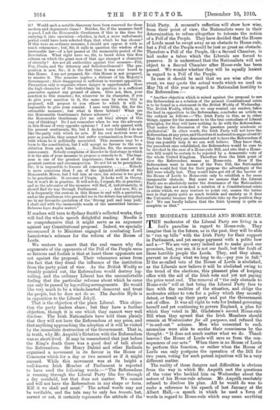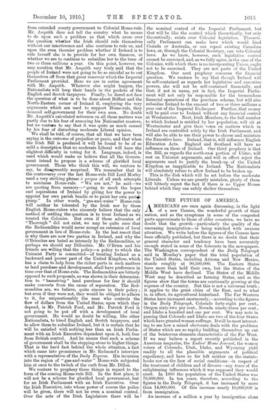THE MODERATE LIBERALS AND HOME-RULE.
filHE moderates of the Liberal Party are living in a fool's paradise in regard to Home-rule. They imagine that in the future, as in the past, they will be able to " run up bills " with the Irish Party for their support in Parliament, and yet escape payment with a polite bow and a—" We are very sorry indeed not to make good our promises, but, you see, it is not our fault, but the fault of those horrible people the Lords. They, and they alone, prevent us doing what we long to do,—pay you in full." If the so-called veto of the House of Lords is abolished, as the Liberals now believe it will be abolished owing to the trend of the elections, this pleasant plan of keeping office with the aid of the Irish vote and yet not paying the price must end. The removal of " the only obstacle to Home-rule" will at last bring the Liberal Party face to face with the realities of the situation, and oblige the moderates either to vote for a policy which they secretly detest, or break up their party and put the Government out of office. It was all right to vote for Ireland governing herself and yet continuing to govern England, a plan for which they voted in Mr. Gladstone's second Home-rule Bill when they agreed that the Irish Members should remain at Westminster for all purposes, and refused the " in-and-out " scheme. Men who consented to such anomalies were able to soothe their consciences by the thought : " It does not much matter what we do. Thank heaven ! the House of Lords will save us from the con- sequences of our acts." When there is no House of Lords to perform this function, or rather when the House of Lords can only postpone the operation of the Bill for two years, voting for such patent injustices will be a very different matter.
The reality of these dangers and difficulties is obvious from the way in which Mr. Asquith met the questions of the voter who heckled him on Wednesday about the nature of his Home-rule scheme. Mr. Asquith resolutely refused to disclose his plan. All he would do was to make a reference to his speech of last January at the Albert Hall,—a speech in which he used a form of words in regard to Home-rule which may mean anything from extended county government to Colonial Home-rule. Mr. Asquith dare not tell the country what he means to do upon such a problem as that which arose over the question whether the Irish should rule themselves without our interference and also continue to rule us, and upon the even thornier problem whether if Ireland is to rule herself she is to provide for her own finances, or whether we are to continue to subsidise her to the tune of two or three millions a year. On this point, however, we may mention that Mr. Asquith very truly said that the people of Ireland were not going to be so suicidal as to cut themselves off from that great reservoir which the Imperial Parliament provided. Here we are in entire agreement with Mr. Asquith. Whatever else might happen, the Nationalists will keep their hands in the pockets of the English and Scotch taxpayers. Finally, be dared not face the question of what is to be done about Belfast and the North-Eastern corner of Ireland if, employing the very arguments which are used to support Home-rule, they demand self-government for their own area. No doubt Mr. Asquith's calculated reticence on all these matters was partly due to his fear of annoying his Nationalist masters, but we venture to say that it was quite as much caused by his fear of disturbing moderate Liberal opinion. We shall be told, of course, that all that we have been saying is the outcome of prejudice or panic, and that when the Irish Bill is produced it will be found to be of so mild a description that no moderate Liberal will have the slightest difficulty in voting for it. Language, indeed, is used which would make us believe that all the Govern- ment intend to propose is a scheme of glorified local 'government, Those who think this will, we venture to say, be disagreeably surprised. We remember that in the controversy over the last Home-rule Bill Lord Morley used a very striking phrase a propos of all such attempts to minimise Home-rule. " We are not," he said—we are quoting from memory—" going to mock the hopes and aspirations of Ireland by giving her the power to appoint her own parish beadle or to paint her own pariah pump." In other words, " gas-and-water " Home-rule will neither be tolerated by the Irish nor by those English Home-rulers who sincerely believe that the only method of settling the question is to treat Ireland as we treated the Colonies. But even if these advocates of " Thorough " did not exist, we may be quite sure that the Redmondites would never accept an extension of local government in lieu of Home-rule. In the last resort that is why there are now two parties in Ireland, and why the O'Brienites are hated so intensely by the Redmondites, or perhaps we should say Dillonites. Mr. O'Brien and his friends are willing that the policy—a policy to which the Unionist Party is committed—of treating Ireland as a backward and poorer part of the United Kingdom, which has a claim to help from the richer parts in such matters as land purchase and development, shall have preference in time over that of Home-rule. The Redmondites are bitterly opposed to such proposals, as was shown in their determina- tion to " hamstring " land purchase for fear it should make converts from the cause of separation. The Red- mondites are, we believe, quite sincere in their policy ; but even if they were not, they would be obliged to adhere to it, for unquestionably the man who controls the flow of dollars from the United States, upon which they depend, is Mr. Patrick Ford, and Mr. Patrick Ford is not going to be put off with a development of local government. He would no doubt be willing, like other Nationalists, to bleed English and Scotch taxpayers, and to allow them to subsidise Ireland, but it is certain that he will be satisfied with nothing less than an Irish Parlia- ment with an Irish Executive dependent upon it, both free from British control. And he means that such a scheme of government shall be the stepping-stone to higher things. That is the hard fact behind the whole situation, a fact which came into prominence in Mr. Redmond's interview with a representative of the Daily Express. His incursion into the region of " gas-and-water " Home-rule subjected him at once to the twitch of the curb from Mr. Dillon.
We venture to prophesy three things in regard to the form of the coming Home-rule Bill. In the first place, it will not be a scheme for glorified local government, but for an Irish Parliament with an Irish Executive. Over the Irish Executive, into whose power of course the police will be given, there will not be even a nominal control. Over the acts of the Irish Legislature there will be the nominal control of the Imperial Parliament., but that will be like the control which theoretically, but only theoretically, exists over Colonial legislation. Theoreti- cally Parliament can make laws which would bind Canada or Australia, or can repeal existing Canadian laws, or, through the Colonial Secretary, can veto Colonial laws. As we know, however, such legislative control cannot be exercised, and, as we fully agree, in the case of the Colonies, with which there is no incorporating Union, ought not to be exercised. They are not parts of the United Kingdom. Our next prophecy concerns the financial question. We venture to say that though Ireland will be self-contained as regards her legislative and executive powers, she will not be self-contained financially, and that, if not in name, yet in fact, the Imperial Parlia- ment will not only be responsible for the tremendous financial operations of the purchase scheme, but will also subsidise Ireland to the amount of two or three millions a year out of the Imperial Exchequer. Further, that money will be paid over to Ireland without any financial control at Westminster. Next, Irish Members, to the full number to which Ireland is entitled by her population, will sit at Westminster and give their votes on matters which in Ireland are controlled solely by the Irish Parliament, and will also be able to use their power to choose and maintain the Executive here. Ireland, that is, will influence English Education Acts. England and Scotland will have no influence on those of Ireland. Our third prophecy is that the Bill, as regards the north-east portion of Ulster, will rest on Unionist arguments, and will in effect reject the arguments used to justify the break-up of the United Kingdom as inapplicable to Ireland. The Nationalists will absolutely refuse to allow Ireland to be broken up.
This is the dish which will be set before the moderate Liberals. Unless we are greatly mistaken, plenty of them will bitterly regret the fact if there is no Upper House behind which they can safely shelter themselves.



























































 Previous page
Previous page